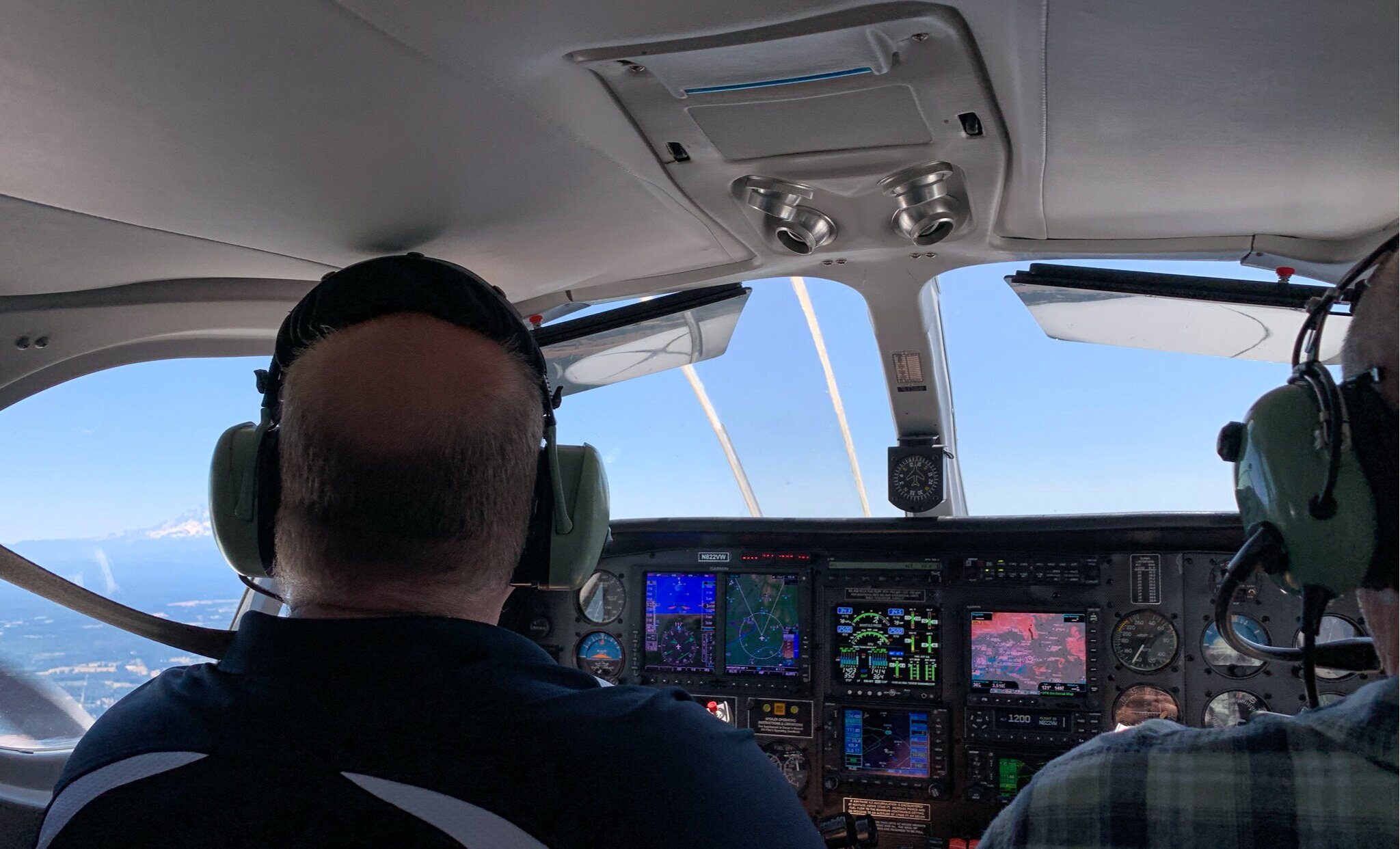
Paying It Forward
Flight Instructing

For many, working as a Certified Flight Instructor (CFI) is the first professional paying job a pilot will get. This is due to there not being a minimum flight hour requirement to work as a CFI. CFIs can obtain additional instructor ratings to teach instrument students as a Certified Flight Instructor with Instrument Rating (CFII) and multi-engine students as a Certified Flight Instructor with Multi-engine Rating (MEI). Additional flight instructor ratings and experience allows you to teach a more diverse range of students, which allows you to build flight time even faster. Some CFIs chose to make a career out of flight instructing opting for a more predictable work/life balance. Other CFIs looking to build flight time to move on to charter, corporate, or airline flying positions, will benefit greatly by building additional flight experience, developing interpersonal skills for crewed cockpits, and building their first resume as a professional pilot. Regardless of the career goal, becoming a CFI will challenge you in developing an in-depth understanding of aeronautical knowledge, acquiring the skill to fly from the right-seat of the airplane, and provide you the ability to teach that information to new and experienced pilots alike. As a CFI you will directly influence and set the foundation for the next generation of pilots! What follows is a brief description of Certified Flight Instructor Certificates and Ratings. Click to Learn More:
Multi-engine training at Safety In Motion Flight Center, WA.
Flight Instructor (CFI)
Pursuing your initial Certified Flight Instructor (CFI) Certificate is one of the most involved and rigorous training programs you will get involved with. At this point in your training as an aviator, you have acquired the aeronautical knowledge and flight proficiency required to become a Commercial Pilot. Up to this point, you have been flying from the left-seat and pretty much just responsible for your actions in controlling the aircraft and ensuring the safety of flight. As a CFI, your training will involve two additional knowledge exams and a practical exam. From an “aeronautical knowledge” standpoint, the subject matter will typically be things you have already been taught to date. What is new, is that you are now going to become an educator. This will require that you gain knowledge in understanding human behavior, motivating students, teaching, evaluating, and curriculum development. The training you receive in these subjects will help prepare you to successfully “teach” your students about flying and ensuring they succeed as future pilots. The flight training portion of your training will have you getting comfortable flying to commercial standards from the right-seat of the airplane, while simultaneously teaching, monitoring student performance, and ensuring the safety of the flight. In short, you will become a “subject matter expert” in the world of pilot training and certification.
-
• Be at least 18-years old
• Able to read, speak, write, and understand the English language
• Hold a commercial pilot certificate with an instrument rating, or an airline transport pilot certificate
• Hold the appropriate aircraft category/class rating for the instructor certificate sought (airplane-single engine or airplane-multi-engine) (Note: CFI does not differentiate land or sea class ratings)
-
The aeronautical knowledge portion will be the most comprehensive part of becoming a Certified Flight Instructor (CFI) and will require you to take two knowledge exams (there is an exception for certified teachers). You will study the Aviation Instructor’s Handbook and learn about how to teach, interact with others, communicate effectively, develop lesson plans, and evaluate knowledge and performance. You will then take the “Fundamentals of Instructing (FOI)” written exam. Additionally, you will re-review all prior knowledge regarding aircraft systems, aerodynamics, performance planning, navigation, regulations, and related FAA publications, then take the “Flight Instructor-Airplane (FIA)” written exam. Many people will additionally take the “Advanced Ground Instructor (AGI)” written exam as well since it is essentially the same test, which awards you with yet another FAA certificate for Ground Instructor. Learn more about Testing HERE.
-
Flight training for the CFI certificate is basically completed in two stages. The first stage is simply getting you proficient to fly the airplane from the right seat and able to fly both Private Pilot and Commercial Pilot maneuvers to the standards published in the FAA’s Airmen Certification Standards. The second stage is teaching the same maneuvers to your flight instructor and evaluating/correcting common errors that your instructor will simulate in flight. You will also receive training and an endorsement in demonstrating pilot and instructional proficiency in stall awareness, spin entry, spins, and spin recovery procedures.
Part 141 requires 25 hours of flight training and 40 hours of ground instruction for the initial CFI training. There are no minimum hour requirements for either ground or flight training under Part 61, but typically the hour requirements mentioned under Part 141 are close regardless of under which Part the training is conducted.
Additional expenses beyond the basic ground and flight training time requirements:
• Pre- and Post-flight briefings. These total approximately 20-30 minutes per dual flight lesson.
• Pilot training books (Most references can be downloaded in PDF format off the FAA website)
• Aeronautical Charts & References (expire every 56 days)
• Written exam fee for 2-tests (Approximately $160.00 each charged by PSI Testing Services)
• Practical exam fee (Approximately $1,200 charged by the Pilot Examiner as this exam is an all-day event. Oral will last approximately 4 hours followed by a 2-hour flight)
Flight Instructor, Instrument (CFII)
The Flight Instructor, Instrument Rating is added to an existing CFI certificate and allows you to teach students that require instrument experience toward their Commercial Pilot Certificate, and those pursuing an Instrument Rating on their pilot certificate. During this training you will re-review the aeronautical knowledge topics you learned during your instrument rating and acquire a more in-depth understanding of the material, then develop lesson plans so that you can effectively teach it. You will also become proficient in flying in instrument conditions from the right seat of the airplane. This rating requires you to take the “Flight Instructor, Instrument (FII)” written exam, and a practical exam with a Designated Pilot Examiner.
-
Must possess a Certified Flight Instructor Certificate (CFI)
-
The aeronautical knowledge will be a review of the applicable instrument flying knowledge, procedures, regulations, and endorsements. You will take a written exam for Flight Instructor, Instrument. Many pilots will take this exam at the same time they take the “Instrument Rating – Airplane” written exam as it is essentially the exact same test. Some will even take the “Instrument Ground Instructor (IGI) written exam as well during that time, while you possess in-depth and current knowledge on the subject. Learn more about Testing HERE.
-
Flight training for the CFII Rating is basically possessing instructional knowledge and flight proficiency to fly instrument procedures from the right seat. You will increase your multi-tasking skills by simultaneously instructing, talking to ATC, and maintaining situational awareness of aircraft control and instrument procedures.
Flight Instructor, Multi Engine (MEI)
The Flight Instructor, Multi-engine Rating (MEI) is added to an existing CFI certificate and allows you to teach students looking to acquire a multi-engine land airplane rating. For those flight instructors looking to ultimately pursue a career flying charter, corporate, or airlines, this rating will allow you to build the needed additional multi-engine time to meet many of their hiring criteria.
-
• Must possess a Certified Flight Instructor Certificate (CFI)
• Possess a Commercial multi-engine airplane rating
• Have logged 15 hours of PIC time in a multi-engine airplane
-
The aeronautical knowledge will cover a review of the information you learned when getting your commercial multi-engine rating, then focus on your ability to teach that knowledge and flight skills in preparation for the practical exam. There is no written exam for this rating.
-
Flight training for the MEI Rating is basically possessing instructional knowledge and flight proficiency to safely teach and fly multi-engine maneuvers and emergency procedures from the right seat.
Part 141 does not have a separate MEI course as an additional rating, so it refers to the time required for initial CFI Certificate hours of 25 hours of flight training and 40 hours of ground instruction. Part 61 doesn’t require any minimum number of flight or ground training hours. If the applicant is fairly proficient in multi-engine operations, the actual time it takes to prepare for the MEI practical exam is only about 5-10 hours.
Additional expenses beyond the basic ground and flight training time requirements:
• Pre- and Post-flight briefings. These total approximately 20-30 minutes per dual flight lesson
• Pilot training books (Most references can be downloaded in PDF format off the FAA website)
• Practical exam fee (Approximately $700 charged by the Pilot Examiner)
Learn more about Testing HERE.
Flight Instructor Re-Instatement
Safety in Motion works with a fair number of individuals each year that had a CFI certificate at one point in their life, but due to a job, family commitments, etc., have let it lapse out of currency (instructor certificates need to be renewed every 2-years). Having a CFI certificate re-instated simply requires ensuring your knowledge is up-to-date, flight proficiency for the right seat is to FAA standards, and taking a CFI re-instatement practical exam. This training is only conducted under Part 61 regulations.
The practical exam for re-instatement can be based on either the initial CFI certificate, or any other CFI Ratings the applicant may have possessed on their expired CFI certificate (e.g., CFII and/or MEI). For many pilots returning to flight instructing after a professional flying career with most of that time flying under instrument flight rules, re-instating using the CFII (assuming they had that rating before) is typically the easiest and most efficient.
-
• Hold an expired Flight Instructor Certificate
• Able to read, speak, write, and understand the English language
• Hold a commercial pilot certificate with an instrument rating or an airline transport pilot certificate
• Hold the appropriate aircraft category/class rating for instructor reinstatement sought
• Possess current pilot flight review and medical certificate (including ‘Basic Med’)
-
The training content and time it will take varies, depending on which CFI rating you want to reinstate under, how long your CFI certificate has been expired, and your current level of aeronautical knowledge. Essentially, we will work with you to ensure your instructional knowledge is up to date with current procedures, FAA references, and associated aeronautical knowledge and procedures. There are no written exams for reinstatement.
-
There is no minimum flight training time for reinstatement, however, you do need an endorsement from a current CFI to take the practical exam. The duration of training differs significantly between students depending on how long they have been away from flight instructing, general pilot currency, and for those who are coming back to instructing, the type of flying they have been doing.
The Safety in Motion Flight Center staff will assess your currency and help you get your knowledge and flight proficiency back up to standard in the most efficient way possible so that you can get back to using that CFI Certificate again!
Additional expenses beyond the basic ground and flight training time requirements:
• Pre- and Post-flight briefings. These total approximately 20-30 minutes per dual flight lesson
• Pilot training books (Most references can be downloaded in PDF format off the FAA website)
• Practical exam fee (Approximately $800) charged by the Pilot Examiner as a "reinstatement" is typically a normal 4-hour checkride




